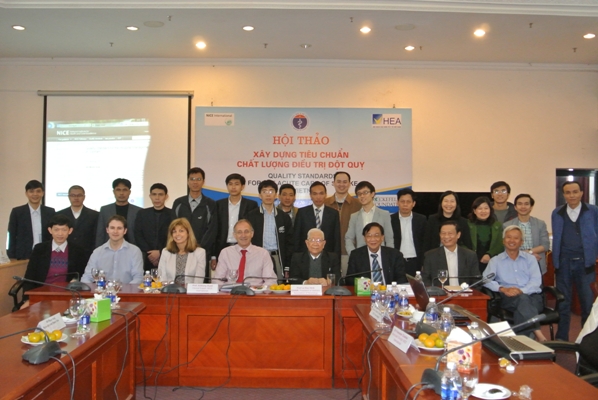On 16-17 July, the Ministry of Health Vietnam launched the Quality Standards for the Hospital Management of Acute Stroke (“the Stroke QS”). This is the first set of evidence-informed quality standards developed locally in Vietnam, with technical assistance from NICE International, and is part of ongoing wider efforts by the Vietnamese government to increase access to good quality care in the 1500 hospitals throughout Vietnam.
The stroke quality standard draws on evidence-based recommendations in the Royal College of Physicians’ National Clinical Guidelines for Stroke. These recommendations were adapted into measurable performance indicators, following the format of NICE quality standards and designed for implementation in the Vietnamese context. The 15 quality standards emphasise prevention, joint working between disciplines, early diagnosis and rehabilitation, including:
- ensuring that transient ischemic attacks (TIAs) are treated as emergencies;
- organising services around ‘specialist stroke units’ with a core multi-disciplinary team, so that stroke patients can be treated more quickly and effectively
- ensuring patients are checked for their swallowing and helped to mobilise early, in order to reduce complications.
The Stroke QS was developed in 9 months over three workshops in Hanoi, through the collaboration of the Department of Medical Services Administration (MSA) under the Ministry of Health, the Vietnamese Health Economics Association, NICE International, and a QS Committee comprising local stroke clinicians and hospital administrators. The QS Committee, co-chaired by Prof Le Duc Hinh, Prof Le Van Thanh and Prof Tony Rudd CBE, identified key areas for quality improvement in stroke care, and developed quality statements and indicators, focusing on potential impact to patient care and local feasibility.
The Ministry of Health has demonstrated the strongest commitment throughout the quality standard’s 9 months of development. The Director of Medical Services Administration, Prof Luong Ngoc Khue, signed the official decision to approve the quality standard and to implement it across Vietnam.
“This QS is the product of joint working between multiple stakeholders, Now we need to put the QS into practice. Let’s emphasise the basic things that can really improve care.”
Vice Minister Prof Le Quang Cuong
Dr Francoise Cluzeau, Associate Director of NICE International, reiterated the key principles of quality standards. “The quality standards are significant because they are based on evidence, and not necessarily about investing in expensive technologies. Simple good practices could potentially improve outcomes for millions of patients and their families.”
For NICE International, the stroke quality standard is a real demonstration of the policy impact from our technical assistance. It follows our similarly successful experience in Kerala, India, in bringing together policymakers and clinicians to make better use of evidence in decision-making, through the development of quality standards for post-partum haemorrhage
Prof Anthony Rudd CBE, National Clinical Director for Stroke in NHS England and who has dedicated his career to improving stroke care for patients in the UK and abroad, said: “Most people who die after a stroke die from preventable complications. The quality standard is a fantastic opportunity to improve quality of care for stroke patients: an opportunity for Vietnam to achieve in 5 years, what has taken the UK and Europe 30 years.”
Second Quality Standard Workshop
March 2014
“This is a very important step for all of us, to mobilise all possible resources to improve our patients’ quality of life.”
Prof Le Duc Hinh President of Vietnam Association of Neurology
On 20 – 21 March, at the Quality Standard workshop in Hanoi School of Public Health (convened by Vietnam Health Economics Association, the Medical Services Administration, Ministry of Health, and NICE International), the Quality Standard Committee agreed a draft set of 15 quality standards for acute stroke care in Vietnam. These standards will cover early diagnosis and stroke unit care through to secondary prevention, and aim to improve hospital care for the 200,000 patients affected by stroke each year. Opening the workshop, Vice Minister Prof Le Quang Cuong said: “Starting with stroke, quality standards will be a model to be replicated in future to other disease areas.”
An overarching discussion topic was ensuring successful implementation of the quality standards. The Quality Standard Committee agreed on the importance of joint working and inclusiveness at all levels, involving the Ministry of Health, provincial Departments of Health, hospitals, clinicians, and professional organisations. Co-Chair Prof Le Duc Hinh (President of Vietnam Association of Neurology), said: “This is a very important step for all of us, to mobilise all possible resources to improve our patients’ quality of life.” The quality standards are now being finalised and will be launched in a final workshop in July 2014.
At the invitation of Co-Chair Prof Le Van Thanh (Chairman of Vietnam Stroke Association), Prof Anthony Rudd CBE (National Clinical Director for Stroke, NHS England) and Dr Francoise Cluzeau from NICE International also presented this work in Ho Chi Minh City for clinicians in Southern provinces , focusing on the experience of establishing and running stroke units.
QS Workshop
November 2013
On 13 – 14 November, VHEA, the Medical Services Administration (Ministry of Health) and NICE International convened the first QS Workshop at the Hanoi School of Public Health. The QS Committee comprised Ministry of Health policymakers, and stroke clinicians from different regions and hospital tiers in Vietnam. Through a consensus process co-chaired by Prof Le Duc Hinh (President of Vietnam Association of Neurology) and Prof Anthony Rudd CBE (National Clinical Director for Stroke, NHS England), the Committee produced a shortlist of high-priority areas of stroke care.
Two further workshops are scheduled in 2014 to develop measureable quality standards within the priority areas, and a pilot implementation plan in line with hospital quality improvement goals outlined in Vietnam’s health strategy. Vice Minister Prof Le Quang Cuong said: “We are aiming to produce not only quality standards, but also real change in behaviour.”

